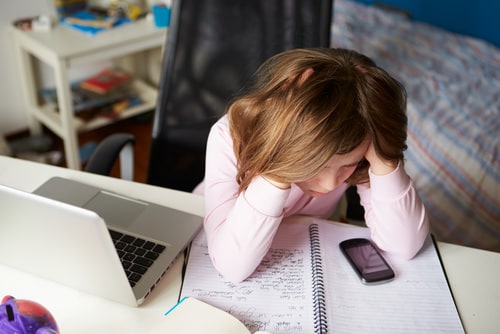
Avoiding School
Children who are being bullied online often try to avoid going to school where they have to face the bullies and their peers. If your child seems to be sick often, it may be because they are faking illness. They may also be legitimately ill because anxiety and stress from bullying can cause symptoms like stomach aches and headaches.
Withdrawn and Emotional
Being bullied online (or off) can cause a child to retreat. If your child is spending more time alone in their room than usual, they may be being bullied. Consider checking how much time they spend online. If they’re always on social media sites, they may be reading bullying posts and comments.
If they express stronger or more volatile emotions than usual it could be a sign of stress. Children can become depressed and sad. They can also become aggressive and have outbursts at home.
Changes in Habits
It’s not uncommon for a child to begin changing their habits in response to online bullying. For example, if your child is being bullied about their weight, they may stop eating meals with you or you may notice that they’re binge eating. If they’re being bullied about the way they dress, they may change what they wear.
Sleeping habits can change, too. They may have trouble sleeping because they’re dealing with nightmares. Or they may sleep more as a means of escape.
If your child was social, they may change their friends or begin avoiding social interaction. It can be difficult for some adolescents to support a friend who is being bullied online. They don’t want to get caught up in it or expose themselves to bullying.
Academic Trouble
When children are being bullied online, it can be difficult for them to stay motivated, focused, and engaged at school. They’re too worried about what people are saying and the rumors being spread about them.
Self-Destructive Behaviors
If online bullying progresses, children can turn to self-destructive behaviors. They may become promiscuous, turn to drugs or alcohol, or start cutting themselves. In some situations, children have taken their own lives in an attempt to escape the stress of online bullying.
If you suspect your child is being bullied online, intervene immediately. There is help. Stay active and involved in your child’s life. Know what social sites they frequent and who their friends are. Don’t ignore your instincts. If you think something might be wrong, start asking questions.
Related: Coping with Teen Bullying

